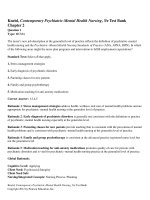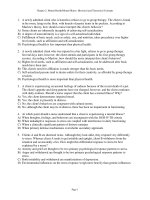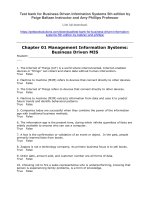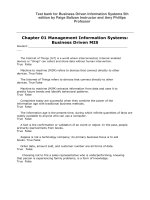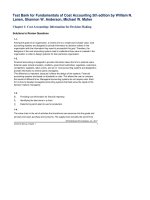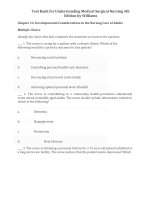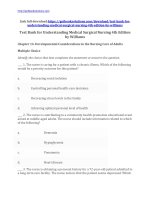Test bank for psychiatric mental health nursing 5th edition by fortinash download
Bạn đang xem bản rút gọn của tài liệu. Xem và tải ngay bản đầy đủ của tài liệu tại đây (444.63 KB, 20 trang )
Test Bank for Psychiatric Mental Health Nursing 5th Edition by
Fortinash
Chapter 06: Neurobiology in Mental Health and Mental Disorder
Test Bank
MULTIPLE CHOICE
1. A patient with depression mentions to the nurse, “ depression is a chemical
disorder. What does she m response is based on the theory that depression
primarily involves
which of the following neurotransmitters?
a.
Cortisol and GABA
b.
COMT and glutamate
c.
Monamine and glycine
d.
Serotonin and norepinephrine
ANS: D
One possible cause of depression is thought to involve one or more
neurotransmitters. Serotonin and norepinephrine have been found to be
important in the regulation of depression. There is no research to support that
the other options play a significant role in the development of depression.
DIF: Cognitive Level: Comprehension REF: Page 104
TOP: Nursing Process: Assessment
Integrity
MSC: NCLEX: Physiological
2. A patient has experienced a stroke (cerebral vascular accident) that
has resulted in damage to the Broca area. Which evaluation does the
nurse conduct to reinforce this diagnosis?
a.
Observing the patient pick up a spoon
b.
Asking the patient to recite the alphabet
c.
Monitoring the patient‟s blood
d.
Comparing the patient‟s grip st hands
ANS: B
Accidents or strokes that damage Broca‟s area may res speak (i.e., motor aphasia). Fine
motor skills, blood pressure control, and muscle strength are not controlled by the Broca
area of the left frontal lobe.
DIF: Cognitive Level: Application
REF: Page 100
TOP: Nursing Process: Implementation MSC: NCLEX: Physiological Integrity
3. The patient diagnosed with schizophrenia asks why psychotropic medications are
always prescribed by the doctor. T will be based on information that the therapeutic
action of psychotropic
drugs is the result of their effect on:
a.
The temporal lobe; especially Wern
b.
Dendrites and their ability to transmit
electrical impulses
c.
The regulation of neurotransmitters especially
dopamine
d.
The peripheral nervous system sensitivity to
the psychotropic medications
ANS: C
Medications used to treat psychiatric disorders operate in and around the
synaptic cleft and have action at the neurotransmitter level, especially in the
case of schizophrenia, on dopamine. The Wernicke‟s ar or the sensitivity of the peripheral
nervous system are not relevant to either schizophrenia or psychotropic medications.
DIF: Cognitive Level: Comprehension REF: Page 104
TOP: Nursing Process: Assessment
Integrity
MSC: NCLEX: Physiological
4. A student nurse mutters that it seems entirely unnecessary to have
to struggle with understanding the anatomy and physiology of the
neurologic system. The mentor would base a response on the
understanding that it is:
a.
Necessary but generally for psychiatric nurses
who focus primarily on behavioral interventions
b.
A complex undertaking that advance practice
psychiatric nurses frequently use in their practice
c.
Important primarily for the nursing assessment of
patients with brain trauma–caused cognitive
symptoms
d.
Necessary for planning psychiatric care for all
patients especially those experiencing psychiatric
disorders
ANS: D
Nurses must understand that many symptoms of psychiatric disorders have a
neurologic basis, although the symptoms are manifested behaviorally. This
understanding facilitates effective care planning. The foundation of
knowledge is not used exclusively by advanced practice psychiatric nurses
nor is it relevant for only behavior therapies or brain trauma since dealing with
the results of normal and abnormal brain function is a responsibility of all
nurses providing all types of care to the psychiatric patient.
DIF: Cognitive Level: Comprehension
Process: Planning
MSC: NCLEX: Physiological Integrity
REF: Page 98
TOP: Nursing
5. A patient asks the nurse, “My wife has breast canc caused by her chronic
depression?” Which response research data?
a.
“Too much stress has been prove kinds of cancer.”
b.
“There have been no researchoneon st stress and
disease yet.”
c.
“Stress does cause the release suppress the
immune system.”
d.
“There appears to be little con stress and diseases
of the body
ANS: C
Research indicates that stress causes a release of corticotropin-releasing
factors that suppress the immune system. Studies indicate that psychiatric
disorders such as mood disorders are sometimes associated with decreased
functioning of the immune system. Research does not support a connection
between many cancers and stress. There is a significant amount of research
about stress and the body. Research has shown that there are some
connections between stress and physical disease.
DIF: Cognitive Level: Application
REF: Page 107
TOP: Nursing Process: Implementation (Teaching and Learning)
MSC: NCLEX: Psychosocial Integrity; Physiological Integrity
6. A patient who has a parietal lobe injury is being evaluated for
psychiatric rehabilitation needs. Of the aspects of functioning listed,
which will the nurse identify as a focus of nursing intervention?
a.
Expression of emotion
b.
Detecting auditory stimuli
c.
Receiving visual images
d.
Processing associations
ANS: D
The parietal lobe is responsible for associating and processing sensory
information that allows for functions such as following directions on a map,
reading a clock, dressing self, keeping appointments, and distinguishing right
from left. Emotional expression is associated with frontal lobe function.
Detecting auditory stimuli is a temporal lobe function. Receiving visual
images is related to occipital lobe function.
DIF: Cognitive Level: Application
Process: Planning
REF: Page 101
TOP: Nursing
MSC: NCLEX: Psychosocial Integrity
7. At admission, the nurse learns that some time ago the patient had an
infarct in the right cerebral cortex. During assessment, the nurse
would expect to find that the patient:
a.
Demonstrates major deficiencies in speech
b.
Is unable to effectively hold a spoon in the
left hand
c.
Has difficulty explaining how to go about using the
telephone
d.
Cannot use his right hand to shave himself or
comb his own hair
ANS: B
The cerebral hemispheres are responsible for functions such as control of
muscles. The right hemisphere mainly controls the motor and sensory
functions on the left side of the body. Damage to the right side would result in
impaired function on the left side of the body. The motor cortex controls
voluntary
motor
activity.
Broca‟s
area
controls
motor
functions
are
attributed
to the
association
cortex.
T
motor activity is controlled by the left cerebral cortex.
DIF: Cognitive Level: Application
TOP: Nursing Process: Assessment
Integrity
REF: Page 99
MSC: NCLEX: Physiological
8. A patient with chronic schizophrenia had a stroke involving the hippocampus. The
patient will be discharged on low doses of haloperidol. The nurse will need to
individualize teaching by:
a.
Including the patient‟seducationcaregiv
b.
Being careful to stress the importance of taking
the medication as prescribed
c.
Providing the education at a time when the patient
is emotionally calm and relaxed
d.
Encouraging the patient to crush or dissolve
the medication to help with swallowing
ANS: A
The hippocampus plays a major role in short-term memory and, hence, in
learning. Taking the medication as prescribed and providing the education at
a time when the patient is calm and relaxed is information or considerations
that all patients should be given. The medication does not necessarily need to
be crushed or dissolved since the stroke would not have caused difficulty with
swallowing.
DIF: Cognitive Level: Application
Process: Planning
REF: Page 102
TOP: Nursing
MSC: NCLEX: Physiological Integrity
9. The physician tells the nurse, “The medication I‟m patient enhances the gaminobutyric acid (GABA) system.” Wh patient behavior will provide evidence that
the medication therapy is
successful?
a.
The patient is actively involved in playing cards
with other patients.
b.
The patient reports that, “I do I did a couple of days
ago.”
c.
The patient reports that both auditory and visual
hallucinations have decreased.
d.
The patient says that, “I am much h before I came to
the hospital.”
ANS: B
GABA is the principle inhibitory neurotransmitter. The medication should
provide an antianxiety effect. Alertness, psychotic behaviors, and mood
elevation are not generally affected by g-aminobutyric acid.
DIF: Cognitive Level: Application
Process: Evaluation
REF: Page 105
TOP: Nursing
MSC: NCLEX: Psychosocial Integrity
10.
The patient‟s family asks whether a diagnosis disease creates an increased
risk for any mental health issues. What
question would the nurse ask to assess for such a comorbid condition?
a.
“Has your father exhibited any depression?”
b.
“Does your father seem to exper swings?”
c.
“Have you noticed your father t things you can‟t
see?”
d.
“Is your dad preoccupied with b needs to repeat
over and over?”
ANS: A
Serotonin and its close chemical relatives, dopamine and norepinephrine,
are the neurotransmitters that are most widely involved in various forms of
depression. Most researchers agree that the immediate cause of
parkinsonism is a deficiency of dopamine and so a patient with Parkinso disease should
be monitored for depression, The other mental health disorders (bipolar disorder,
hallucinations, and obsessive compulsive
disorder)
have
not
been connected
to Parkinson‟s
dise
DIF: Cognitive Level: Analysis
REF: Pages 106-107
TOP: Nursing Process: Assessment
MSC: NCLEX: Psychosocial Integrity; Physiological Integrity
11.
Which explanation for the prescription of donepezil (Aricept)
would the nurse provide for a patient in the early disease?
a.
It will increase the metabolism of excess GABA.
b.
Excess dopamine will be prevented from attaching
to receptor sites.
c.
Serotonin deficiency will be managed through a
prolonged reuptake period.
d.
The acetylcholine deficiency will be managed
by inhibiting cholinesterase.
ANS: D
Decreased levels of acetylcholine are thought to produce many of the
behavioral symptoms of Alzheimer‟s disease. The inhib has on cholinesterase will slow
down the breakdown of acetylcholine and so delay the onset of symptoms. The other
neurotransmitters (GABA, dopamine,
and serotonin)
are
not
currently
believed
to play
a r
DIF: Cognitive Level: Application
REF: Page 107
TOP: Nursing Process: Implementation
MSC: NCLEX: Physiological Integrity; Psychosocial Integrity
12.
There remains a stigma attached to psychiatric illnesses.
The psychiatric nurse makes the greatest impact on this
sociological problem when:
a.
Providing educational programming for patients
and the public
b.
Arranging for adequate and appropriate social
support for the patient
c.
Assisting the patient to achieve the maximum
level of independent functioning
d.
Regularly praising the patient for seeking and
complying with appropriate treatment
ANS: A
Much of the stigma attached to psychiatric illness is due to a lack of
understanding of the biologic basis of these disorders. Therefore, effective
patient, family, and public teaching is an important function of the role of the
psychiatric mental health nurse. While the remaining options are appropriate,
they are not directed towards eliminating social stigma but rather empowering
the patient.
DIF: Cognitive Level: Comprehension REF: Page 112
Process: Planning
TOP: Nursing
MSC: NCLEX: Psychosocial Integrity
13.
The wife of a patient with paranoid schizophrenia tells the nurse,
“I‟ve learned that my husband has several close re disorder. Does this problem run
in families?” The recent discoveries in the field of genetics would be:
a.
“Your children should be monito disorder.”
b.
“Research tends to support a fa schizophrenia.”
c.
“There is no concrete evidence; coincidence.”
d.
“Only bipolar disorder iedhasto havbeen a genetic
component.”
ANS: B
Familial tendencies appear with several psychiatric disorders including
schizophrenia. To insinuate that the children are at such risk would not be
supported by research.
DIF: Cognitive Level: Application
REF: Page 108
TOP: Nursing Process: Implementation MSC: NCLEX: Psychosocial Integrity
14.
A patient whose symptoms of mild depression have been
managed with antidepressants is concerned about the affect of
accepting a promotion that will require working the night shift. What will
be the basis of the response the nurse gives to address the patient‟s
concern?
a.
The connection between a new job and possible
depression does exist.
b.
The medication can be adjusted to manage any
increase in depression.
c.
The interruption in normal wake-sleep patterns
can influence mood disorders.
d.
The change in sleep routine can be managed with
a healthy sleep hygiene routine.
ANS: C
Many psychiatric and medical disorders occur more frequently or are
exacerbated when sleep patterns and biologic rhythms are disrupted. While
the remaining options contain true information regarding the management of
depression that is a result of sleep disruption, they do not effectively
address the patient‟s concern.
DIF: Cognitive Level: Application
Process: Planning
REF: Page 108
TOP: Nursing
MSC: NCLEX: Psychosocial Integrity; Physiological Integrity
15.
The nurse is discouraged because the patient exhibiting negative
symptoms of schizophrenia has shown no improvement with the
planned interventions to reduce the symptoms. The that helps place the problem in
perspective is:
a.
“You aren‟tsponsiblre for the behavior of any
other person.”
b.
“Patients can be perverse and c despite our efforts.”
c.
“Negative symptoms have been as genetic
pathology.”
d.
“It will take several „trail an the right combination
care.”
ANS: C
A complex disorder, such as schizophrenia, most likely has multiple
contributing factors, including genetic predisposition, prenatal development,
and the environment. Nurse frustration can be alleviated by helping the nurse
realize that negative symptoms may be the result of actual brain dysfunction,
rather than psychologically determined behaviors; thus the remaining options
are not appropriate since they do not address the complexity of the problem.
DIF: Cognitive Level: Application
REF: Page 106
TOP: Nursing Process: Implementation MSC: NCLEX: Psychosocial Integrity
MULTIPLE RESPONSE
1. What assessment data would reinforce the diagnosis of temporal lobe
injury in patient who experienced head trauma? Select all that apply.
a.
Inability to balance a checkbook
b.
Uncharacteristically aggressive
c.
Affect fluctuates dramatically
d.
Increased interest in sexual behaviors
e.
Difficulty remembering the names of
family members
ANS: C, D, E
The temporal lobe is involved with memory as well as increased sexual focus
and altered emotional responses. Personality and intellectual function is not
centered in the temporal lobe.
DIF: Cognitive Level: Application
TOP: Nursing Process: Assessment
Integrity
REF: Page 101
MSC: NCLEX: Physiological
2. A patient has begun experiencing dysfunction of the hypothalamus.
What nursing interventions will the nurse include care? Select all that apply.
a.
Reinforcing clear physical boundaries
b.
Assisting the patient with completing daily menus
c.
Learning about healthy sleep hygiene habits
d.
Monitoring and recording temperature every 4
hours
e.
Monitoring and recording blood pressure every
4 hours
ANS: B, C, D
The hypothalamus is responsible for regulation of sleep-rest patterns, body
temperature, and physical drives of hunger. Social appropriateness and blood
pressure is not controlled by the hypothalamus.
DIF: Cognitive Level: Analysis
Process: Planning
REF: Page 102
TOP: Nursing
MSC: NCLEX: Physiological Integrity
3. The nurse is preparing a patient for a positron emission tomography
(PET) scan. Which instructions will the nurse include? Select all that
apply.
a.
There will likely be a 30 to 45 minute wait between
the injection and the beginning of the scan.
b.
A blindfold and earplugs may be used to help
decrease reaction to the environment during the
scan.
c.
Make every attempt to lie still during the
scan because movement will affect the
imaging produced.
d.
No food or fluids are to be ingested for at least 8
full hours before the scan and none during the
scan.
e.
Staying awake during the scan is important since
the results are altered when the patient is in any
phase of the sleep state.
ANS: A, B, C, E
Appropriate patient preparation for a PET scan would include information
regarding the time interval between injection of the isotope and the actual
scan, the fact that steps will be taken to minimize the effects of sights and
sounds during the scan, lying still is critical to achieving a quality image, and
that being asleep during the scan will alter the results. It is not necessary to
fast before or during the scan.
DIF: Cognitive Level: Application
REF: Page 110
TOP: Nursing Process: Implementation MSC: NCLEX: Physiological Integrity
4. A patient with schizophrenia is described as “havi executive functions.” What patient
dysfunction can assess behaviorally? Select all that apply.
a.
Invades the personal space of others frequently
b.
Consistently fails to bring money when going
to buy snacks
c.
Cannot remember the names of staff who
often provide care
d.
Requires repeated reinforcement on how to make
a sandwich
e.
Frequently speaks of hurting himself or of hurting
other patients
ANS: A, B, D
Executive functions include reasoning, planning, prioritizing, sequencing
behavior, insight, flexibility, judgment, focusing on tasks, responding to
social cues, and attending in appropriate ways to incoming stimuli. Memory
is not considered an executive function and risk for harm to self and others is
not generally a diagnosis appropriate for such a patient.
DIF: Cognitive Level: Application
REF: Page 100
TOP: Nursing Process: Assessment
MSC: NCLEX: Physiological Integrity: Physiological Adaptation
5. The unit physicians have ordered magnetic resonance imaging (MRI)
tests for the following patients. For which patients would the nurse
decline to make test arrangements without further discussion with the
physician? Select all that apply.
a.
A patient who is claustrophobic
b.
A patient who is breastfeeding
c.
A patient who has an allergy to iodine
d.
A patient who had a total knee replacement
e.
A patient who is taking a neuroleptic medication
